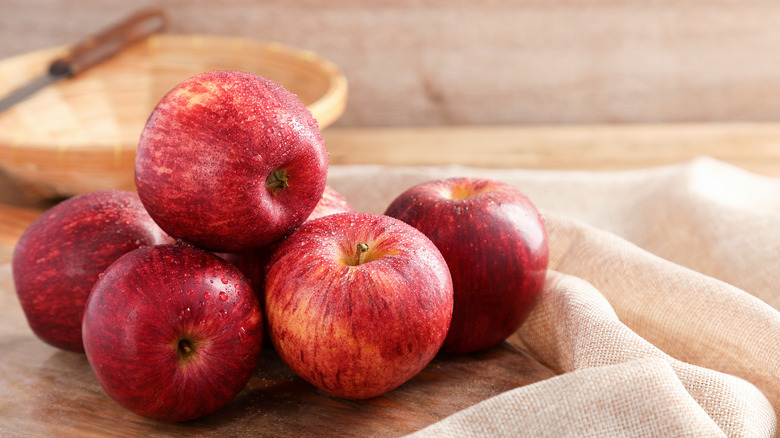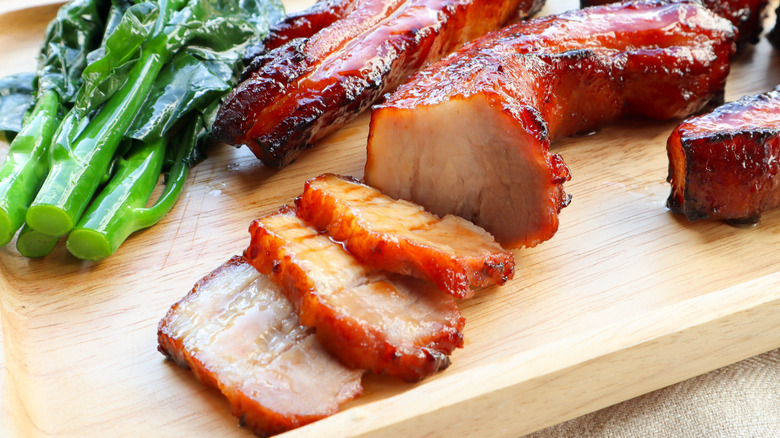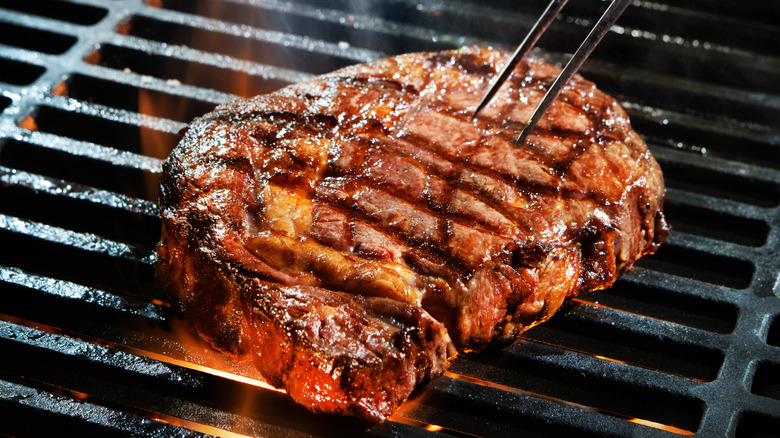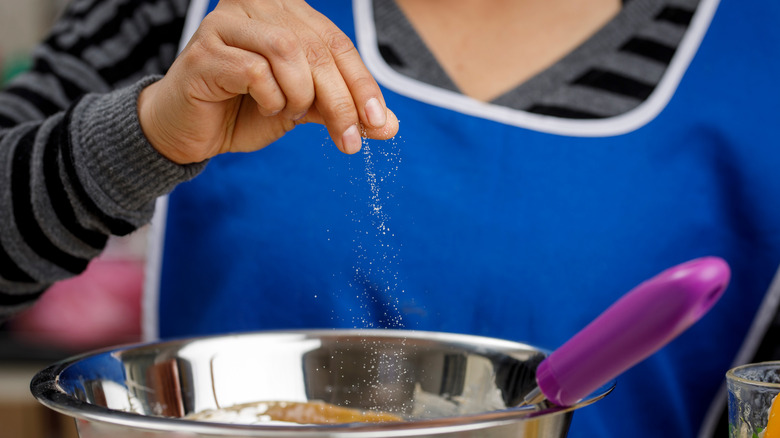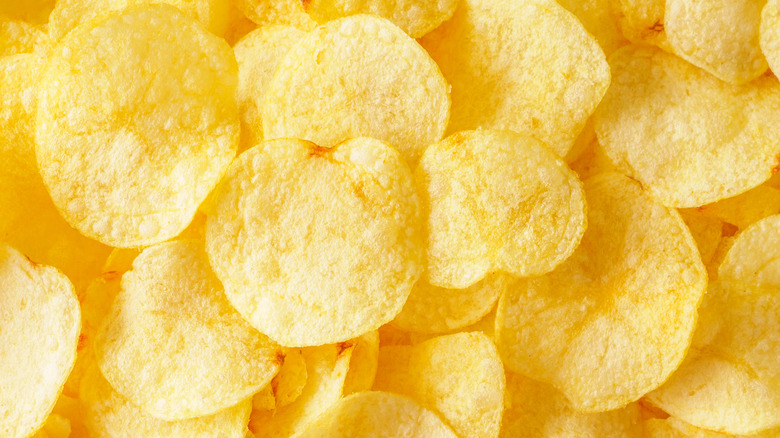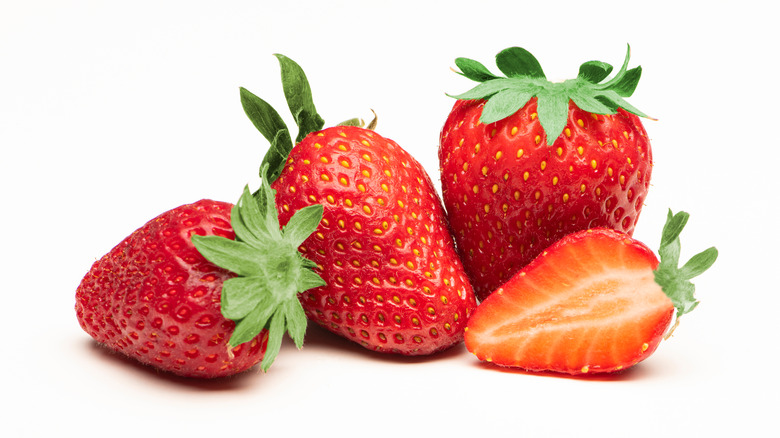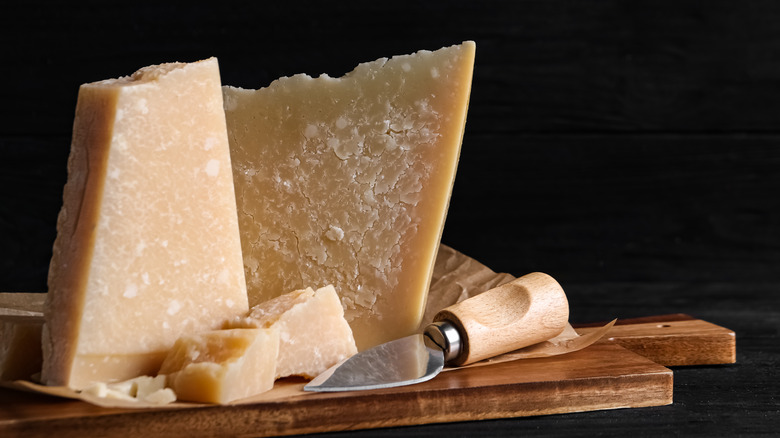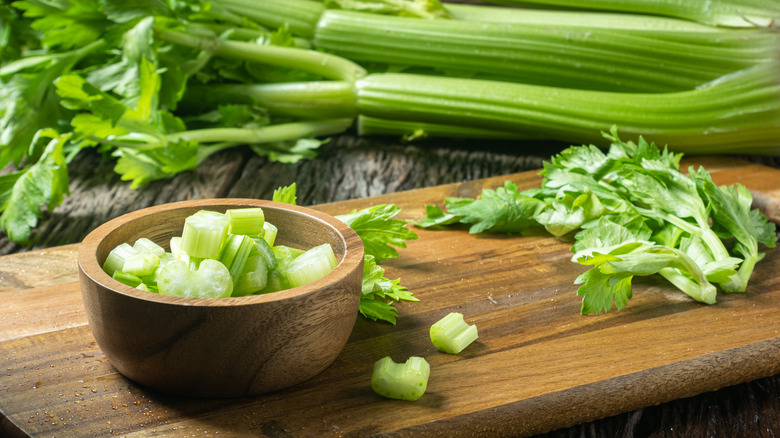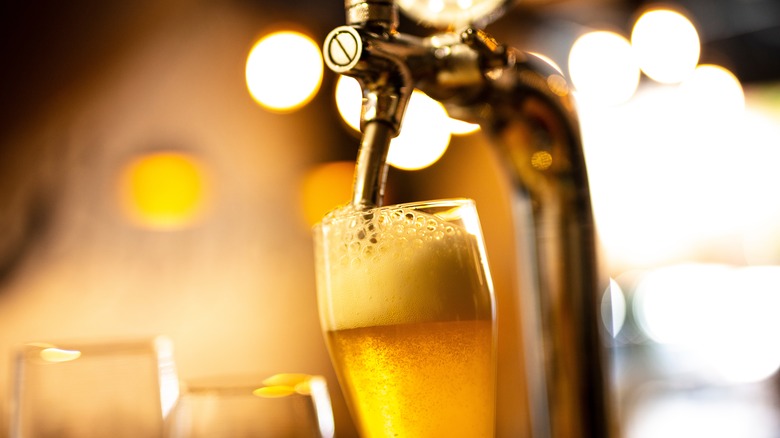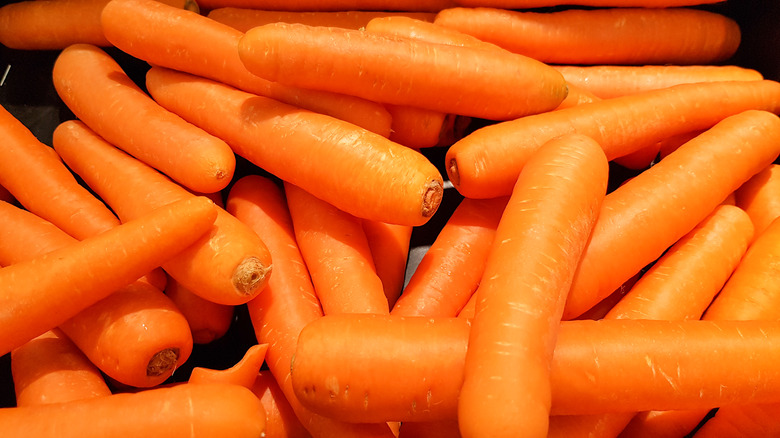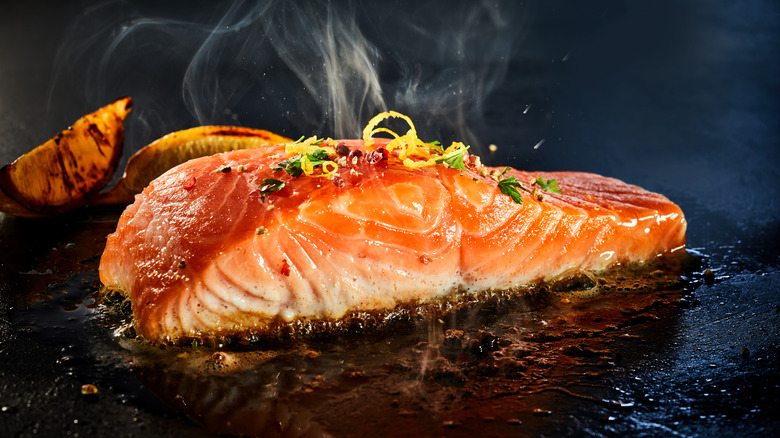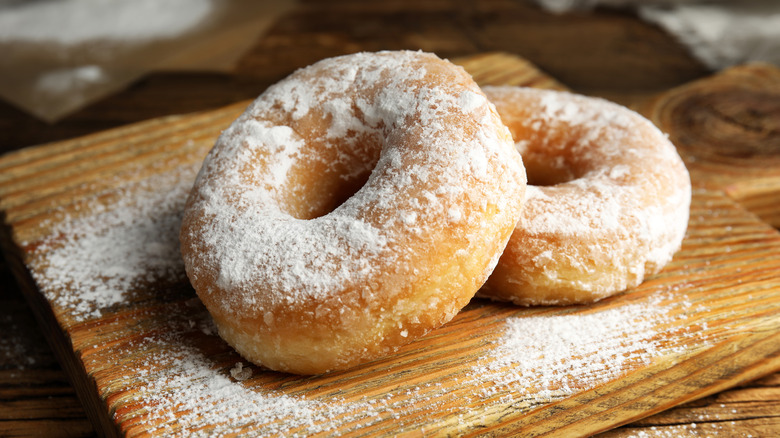7 Foods To Eat And 7 To Avoid When You Have Parkinson's
Chances are you've heard of Parkinson's disease. You might even be familiar with some of its potential symptoms, like difficulty walking and maintain balance, uncontrollable shaking, and a general slowness in one's movements (via the Michael J. Fox Foundation). But what you might not realize is that the symptoms of Parkinson's or PD can vary from person to person — and that beyond medical treatments, lifestyle changes can help someone better manage this disease.
Although we are still learning about PD, we do understand that a major aspect of Parkinson's is a chemical called dopamine. Remember, our brains create chemicals like dopamine, but when someone develops PD, the cells in their brain responsible for producing dopamine either die or shut down. This is why Parkinson's can not only affect one's movement, but also impact other bodily functions and cause health issues like constipation. In addition, someone with PD might have trouble remembering things and/or experience depression.
While there is no cure for Parkinson's at this time, that doesn't mean there aren't treatment options. However, as the Michael J. Fox Foundation explains, since Parkinson's can affect everyone differently, what works for one person with PD might not be a good idea for someone else. So, if you have Parkinson's, you should always work with a health care professional and let them help you find a meal plan to fit your individual needs.
Try: Apples with skins
While Parkinson's disease can affect people differently, that doesn't mean certain symptoms haven't emerged as typical of PD. Case in point: constipation, which the Michael J. Fox Foundation points out can not only be unpleasant but also interfere with different medications used to treat PD. Fortunately, diet can help with Parkinson's-related constipation.
The reason why a potential side effect of PD is constipation is because Parkinson's can impact the digestive system. Specifically, the disease can disrupt the autonomic nervous system, and (as its name indicates) this can throw off bodily functions that we do automatically. In other words, you don't need to think about digesting food. Your body does so on its own. But PD can slow down the normal movements in one's digestive system, and that can cause constipation. However, foods like apples with their skins are good sources of fiber, which can help keep a person regular.
Besides possibly helping with digestive issues, leaving the skins on apples can actually give you more nutrients like vitamins and minerals than eating skinned apples (via Healthline). For example, according to the U.S Department of Agriculture (USDA), 100 grams of raw apple with skin has 4.6 milligrams of vitamin C. However, that same amount of raw apple without skin has only 4 milligrams of vitamin C (per USDA).
Avoid: Too much pork
The "protein effect" might sound like something related to a dieting plan that involves cutting out carbs. But it actually refers to a concern for Parkinson's patients who take a medication called levodopa, per the American Parkinson Disease Association (APDA). And if you guessed that foods that contain high amounts of protein like pork are part of this "protein effect," you'd be absolutely correct.
To fully understand how the "protein effect" works, we first need to talk about levodopa and how it can be helpful for managing Parkinson's. As MedlinePlus explains, the lower levels of the chemical dopamine are why patients with PD can experience a wide range of symptoms, including movement issues, stiffness, and tremors. The brain, however, can turn levodopa into dopamine, which helps it compensate for lower amounts of natural dopamine. As the APDA points out, though, protein-rich foods like pork can interfere with how someone's body absorbs levodopa.
The good news is that it might not be necessary to completely cut pork from one's diet even if they do take levodopa (via ParkinsonsDisease.net). Instead, they might want to only eat a portion-controlled amount of pork for dinner, but not at any other point throughout the day. Also, having smaller amounts of protein in general throughout the day might lessen the chances of it interfering with levodopa. However, one should always speak with a medical professional before making such changes to their diet.
Try: Water with lemon slices
One of the basic ways our bodies keep us from getting dehydrated is making us feel thirsty. However, as the Neurology Solutions Movement Disorders Center explains, a person with Parkinson's might not become thirsty like someone without PD. In addition, Parkinson's patients sometimes have difficulty swallowing liquids, which can make it harder to stay properly hydrated. Plus, side effects from different medications can also contribute to dehydration in Parkinson's patients. However, there are a few simple tricks that can help someone with Parkinson's stay hydrated.
For one, putting slices of lemon in water can help. Why? Well, even though lemons are bitter, they do add a touch of refreshing flavor to plain water, making it more appealing. And if swallowing is an issue, sticking a straw in the lemon-flavored water might make drinking an easier process for some Parkinson's patients. Also, a person with PD might want to schedule in when they need to hydrate just as they would their medications. In other words, setting an alarm and keeping a log can help avoid dehydration.
While it can be difficult to keep up with a hydration routine, it's especially important for someone with PD. Not only can dehydration further impede a PD patient's neurological functions, but it can also lead to a number of health issues like constipation, high blood pressure, and organ failure.
Avoid: Chewy meats
It's only natural to take certain things for granted. For example, when you're eating while watching TV, do you really pay attention to how you're chewing and swallowing your food? Probably not, but for someone with Parkinson's, this everyday activity can become more challenging to the point that certain foods like steaks and other chewy meats might become problematic.
According to the Parkinson's Foundation, Parkinson's can affect how someone moves, including how they move their jaws and tongue. One possible change that can take place is a PD patient might move slower than they did before, which can interfere with eating and swallowing. In fact, trouble swallowing is a medical condition called dysphagia — and unfortunately, not only can dysphagia make eating foods like chewy meats more difficult, but it can also be dangerous. For example, if a person has problems swallowing, foods and drinks might go down into the lungs instead of the stomach. And this has the potential to be fatal.
While not eating chewy meats is one way to avoid possible dysphagia-related problems, there are options for Parkinson's patients who don't want to avoid foods like steaks entirely. As Medical News Today points out, there are ways to tenderize chewy meats so that they'll be easier to chew and swallow. For example, chopping up meat and cooking it in a casserole might make it softer and not as difficult to swallow.
Try: A little more salt
Now before we explore this next item, let's be clear about something. Adding a little more salt to your diet does not mean eating foods that are high in sodium. As the Cleveland Clinic points out, too much sodium has the potential to raise one's blood pressure. But with that said, carefully adding a little more salt to healthy foods like vegetables could help PD patients who have a specific type of low blood pressure.
As neurologist Dr. Michal Gostkowski tells the Cleveland Clinic, "Many people with Parkinson's have orthostatic hypotension," which is when a person's blood pressure drops under certain circumstances. For example, a person with orthostatic hypotension might become dizzy and even lose consciousness when they go from a sitting to a standing position. In addition, someone with this condition might become nauseous, feel weak and/or confused, and have blurry vision (via the Mayo Clinic). And of course, even if a person falls but doesn't pass out from low blood pressure, they can still, for example, hit their head or injury another part of their body.
Even if you have Parkinson's and orthostatic hypotension, you should still speak with a health care professional before adding any amount of salt to your diet. Also, you should keep track of the sodium in everything you eat and drink. Remember, even if a food is sweet, it can still contain a notable amount of sodium.
Avoid: Greasy foods
As the medical community has researched Parkinson's, they've developed several different types of medications to help treat the disease, per the Cleveland Clinic. But like many treatments, some of these medicines have side effects, including nausea. And unfortunately, eating greasy foods can worsen PD-related nausea.
Before we talk about specific kinds of greasy foods that might be problematic for patients with Parkinson's, let's explore which medications in particular can cause nausea. According to the Cleveland Clinic, levodopa, which is prescribed to help with Parkinson's-related stiffness, tremors, and movement issues, can make one nauseous. However, pairing with carbidopa can help at least reduce the severity of one's nausea, as well as other side effects of this Parkinson's treatment. Besides levodopa, dopamine agonists, which can help the brain compensate for lower levels of dopamine, also have nausea as a side effect. Additionally, MAO-B inhibitors (drugs that keep your brain from breaking down dopamine) can also cause nausea.
Of course, letting your health care professional know about any medication's side effects is important, since there might be treatment options. With that said, WebMD recommends avoiding greasy foods if you have Parkinson's and have nausea. So, if doughnuts, potato chips, or deep-dish pizzas are your favorite foods, they might be exacerbating your PD-related nausea (via Healthline). And if you're not sure if a food counts as greasy, think about its recipe and how much oil is needed to prepare it.
Try: Strawberries
Thanks to marketing, we're all familiar with the term "antioxidants." However, commercials for products that have antioxidants typically don't explain exactly why they're good for you. Well, as Everyday Health explains, we make molecules known as free radicals, which can do damage throughout our bodies. Antioxidants help protect us from these free radicals, and as neurologist Dr. Indu Subramanian told Everyday Health, berries are a good source of antioxidants. Okay, but how might antioxidants help with Parkinson's disease?
To be fair, there is some debate in the scientific community about whether antioxidants do make a noteworthy impact on PD (via the Parkinson's Foundation). With that said, Dr. Subramanian specifically noted that consuming foods containing high amounts of antioxidants can be beneficial for one's brain. And this is potentially good news for someone with Parkinson's, since PD directly affects the brain, (per the Michael J. Fox Foundation). While berries in general are good sources of antioxidants, strawberries are particularly high in them, according to a study in the Nutrition Journal.
WebMD notes that half a cup of strawberries is packed with roughly 160 milligrams of especially powerful antioxidants called polyphenols, which have the potential to not only prevent your cells from being damaged by free radicals, but also undo existing damage. Additionally, the polyphenols in strawberries can aid with blood sugar and blood pressure management. They also can help support both your digest and immune systems.
Avoid: Aged cheeses
Now, if you have Parkinson's and love cheese, don't worry. Not every type will be on this list. But if some of your favorites include parmesan, feta, Camembert, cheddar, blue, and Swiss cheese, then unfortunately, you might need to rethink which cheese is on your plate, since all of them contain large amounts of a compound called tyramine (via WebMD).
Before we go any further, we need to talk about a type of treatment for PD. As the Michael J. Fox Foundation explains, Parkinson's and lower-than-normal levels of dopamine go hand in hand. But our bodies are supposed to break down dopamine, and we do so with an enzyme called Monoamine Oxidase Type B (MAO-B), per the Parkinson's Foundation. So, when someone's body is not producing enough dopamine and is also destroying the little it has produced, that can be a recipe for PD-related health issues. This is why Parkinson's patients are sometimes prescribed MAO-B inhibitors, since they help prevent the MAO-B enzyme from breaking down dopamine.
While MAO-B inhibitors can help with some of the symptoms of PD, there are potential drawbacks. Although the MAO-B enzyme breaks down dopamine, that's not it's only job. It also breaks down the tyramine in foods like aged cheeses (per WebMD). And if tyramine remains in the body, it can lead to spikes in blood pressure.
Try: Celery
When most of us think about staying properly hydrated, our minds usually go to drinking more water. However, certain foods like celery are loaded with water, making them potentially good for someone with Parkinson's, according to Parkinson's News Today.
Keep in mind that PD patients often have to be wary of dehydration, depending on what medications they're taking and the side effects of those medications. However, as registered dietitian Megan Ware told Live Science, "Because of its high water content, celery is a great snack to have on hand during the hot summer months to prevent dehydration." Also, the Neurology Solutions Movement Disorders Center notes that PD patients sometimes worry about incontinence. However, when compared to drinking water, consuming water from food usually results in less frequent trips to the bathroom to urinate.
In addition to its water content, celery is also loaded with fiber. As the Mayo Clinic explains, this can help PD-patients manage another common health issue related to Parkinson's: constipation. Plus, celery is rich in vitamin K, and has notable amounts of potassium and folate (via Live Science). One more important note: While some research supports that celery might help with inflammation and has antioxidant properties, the American Institute for Cancer Research says more data is needed on celery's impact on humans regarding these specific potential health benefits.
Avoid: Alcohol
We've all seen movies where a student in a chemistry class puts the wrong combination of chemicals in a beaker and causes anything from an explosion to a big mess. And while this is usually played for laughs, real-life chemistry can be a sensitive balancing act where one additional element can lead to unintended consequences. Such is the case with medications used to treat Parkinson's disease and alcohol.
As the Michael J. Fox Foundation explains, medications like the ones used for Parkinson's are eventually metabolized. In other words, our bodies break them down and get rid of them after they've been in our systems for a certain amount of time. But if a PD patient has alcohol in their system, that could cause their body to break down a drug faster than normal. And if this occurs, then the drug might not help with PD symptoms for as many hours as it's supposed to because it's excreted from the body too quickly.
Besides possibly interacting with PD medications, drinking large amounts of alcohol — especially over a long period of time — can lead to health issues like liver and heart disease, an impaired immune system, and several different types of cancer, per the Centers for Disease Control and Prevention (CDC). It also can increase the chances of developing anxiety and depression, raise one's blood pressure, impact one's memory, and cause a stroke.
Try: Carrots
Bugs Bunny might have been on to something with his love of carrots. According to the Michael J. Fox Foundation, doctors usually recommend vegetables as part of a good diet plan for Parkinson's patients. This is because the antioxidants in vegetables can help the body get rid of a substance called free radicals, which can damage a person on a cellular level. And carrots are a good source of antioxidants, making them a potentially positive addition to a PD-friendly meal plan.
In addition to containing antioxidants, carrots are also packed with other nutrients that might be helpful for someone with Parkinson's. For example, WebMD recommends that PD patients with constipation eat raw carrots in particular, since these crunchy vegetables have a large amount of fiber. Also, the Parkinson's Foundation points out that people with PD are more likely to have brittle bones and experience fractures, especially in the hips and kneecaps. Carrots are a good source of vitamin K and calcium, both of which can help keep one's bones strong and healthy.
Although carrots can be a healthy choice for Parkinson's patients, eating too many of them has the potential to cause a condition called carotenemia (per WebMD). This is because carrots contain high amounts of beta-carotene. While this is usually a temporary health concern that turns one's skin an orangish color, carotenemia does have the potential to negatively impact one's immune system, eyesight, metabolism, and bones.
Avoid: Highly processed foods
"Processed foods" is a term that gets thrown around quite a bit. But according to the American Heart Association, a food is considered processed for three reasons: 1) it's packaged, 2) it's prepared, or 3) it's somehow changed from its original form. Unsurprisingly, some foods are more processed than others, falling under the category of highly processed foods (sometimes referred to as ultra-processed foods). Now, this might not seem like a big deal, but if you have Parkinson's-related constipation, knowing the difference between minimally and highly processed foods can be important.
As the Better Health Channel explains, constipation is not only an oft-reported symptom of PD, but it's also sometimes the first symptom of it. And while medications can help treat it, dietary changes like opting for fiber-rich foods over highly processed foods can make a difference. For example, registered dietitian and nutritionist Jessica Fishman Levinson told Prevention that treats like cookies fall under the highly processed food category and are bad choices for managing constipation because they are "high in fat, low in fiber, and low in fluid."
Specifically, foods high in fat have the potential to slow down your digestive system, which can worsen constipation (via Healthline). As for fluid and fiber, water helps expand the fiber in your stool, making it easier to pass, per the Better Health Channel. And according to the Mayo Clinic, fiber makes feces larger and softer, which helps with bowel movements.
Try: Salmon
While Parkinson's can vary from person to person, a common concern that most PD patients need to keep in mind is their bones' health. As the Parkinson's Foundation explains, people with Parkinson's are more likely to develop osteoporosis where they have a lower bone density. So, if they were to fall, they're two or three times more likely to break a bone than someone without PD. Fortunately, adding foods like salmon to one's diet could help strengthen their bones.
So, what is the connection between osteoporosis and Parkinson's? Well, the medical community is still exploring this question, but findings show that lower levels of vitamin D tend to occur in people with Parkinson's. Since vitamin D is an important nutrient for bone health, making sure a PD patient gets enough vitamin D regularly could reduce their chances of developing osteoporosis. And as it turns out, salmon and other fatty fish are good sources of vitamin D.
Although salmon has its potential health benefits, there are a few things to keep in mind. According to Medical News Today, the amount of pollutants and mercury in this fatty fish can make it a bad choice for an everyday meal. Also, keep in mind that salmon can be wild caught or farm-raised, and that the farm-raised variety might contain antibiotics and food dyes.
Avoid: Sugar
This next topic can be difficult to talk about because it involves waste products. However, it's important to understand all possible PD-related health issues, especially if they can interfere with one's quality of life. As the American Parkinson Disease Association (APDA) explains, there are different stages of PD. In its advanced form, an individual might experience fecal incontinence. If this happens, then they might have trouble "holding it" when it comes to their stool.
Now, as one would expect, diet can play a role in fecal incontinence. In particular, the APDA states that Parkinson's patients who have this condition might want to avoid sugar, since it "can contribute to loose stools." This is important because Parkinson's can sometimes affect the muscles that allow someone to release or hold feces. However, keep in mind that sugar doesn't affect every person with PD the same way. Thus, it's possible for one PD patient with this form of incontinence to be able to continue eating sugar, while another one might need to cut it out of their diet.
Besides sugar, foods that contain high amounts of fiber and/or fat could be problematic for someone with PD who has fecal incontinence. However, even if you have Parkinson's and are experiencing this bathroom-related condition, you should still have a health care professional verify that the root of your fecal incontinence is your PD and not a different health concern (like inflammatory bowel disease, for example).


